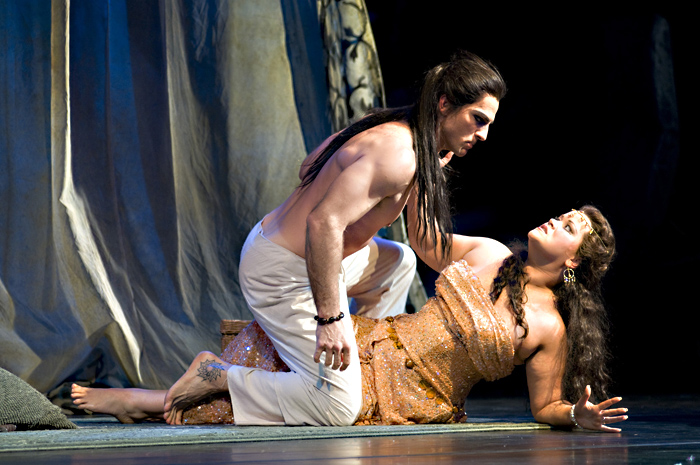A candy box that knows it’s a candy box—unlike some of the huffing-and-puffing Italian melodramas Seattle Opera’s staged lately (I Puritani, Pagliacci)—The Pearl Fishers is Georges Bizet’s sole contribution to the standard opera repertory aside from the unfailingly popular Carmen, written 12 years later at the end of his brief life. Both are full of exotic color and spice and fluent melody, but in contrast to Carmen‘s real-world grit, Fishers is a wistful, even otherworldly fairy tale—not just because it’s set in Ceylon, but because so much of the piece is dreamy reminiscence, as much backstory as story: Two friends clash over a woman, then years later fate throws them all together again.
Conductor Gerard Schwarz, who has a knack for being able to let music linger unhurriedly without letting it get sluggish (a skill he usually manifests in a very different repertory: late romantics like Strauss and Mahler), thus made a good match for the opera, pacing the set pieces beautifully to enhance this floaty, once-upon-a-time mood. The most popular of these, one of operaphiles’ favorite bonbons, is the act 1 tenor/baritone duet. Despite a wonderfully attractive voice, William Burden and his opening-night Gold Cast colleague Christopher Feigum couldn’t work up much urgency here; they remembered their love for the soprano, they remembered their anger, they swore eternal brotherhood, and it all came out much the same. In the Sunday-matinee Silver Cast, Brian Stucki and David Adam Moore brought the duet a little more dramatic oomph; also, Stucki’s tenor has a slightly veiled quality that complements Moore’s voice nicely.
The object of their rivalry, the priestess Leila, is also double-cast. Until act 3, I’d thought Mary Dunleavy’s lovely voice was maybe one shade too heavy for the role, though not too heavy to weigh down the flute-like curlicues of Bizet’s melodies, handled gracefully. But it gave the right thrust to her final Verdian confrontation with Feigum. Larissa Yudina’s voice is more exotic, with a sort of silvery shimmer, and greatly versatile: After the fragile, gossamer hallucination she made out of her cadenza at the end of act 1, her big beefy high notes later came as a thrilling shock.
Lots of extra dancers augment the Seattle Opera chorus and fire up Bizet’s frequent crowd scenes. The production design (Boyd Ostroff’s set and Neil Peter Jampolis’ lighting) is all about scrims and gauzy fabrics, with a picture-postcard lagoon projected on the back wall and a revival of the aerial technology that makes the Rhinemaidens swim in Seattle Opera’s Ring. With Austrian, Hungarian, and German operas scheduled through the summer and three Verdis in a row next season, followed by a world premiere, this’ll be your last chance in quite a while to see the company play musical pâtissier, and they’ve confected a very tasty treat.







